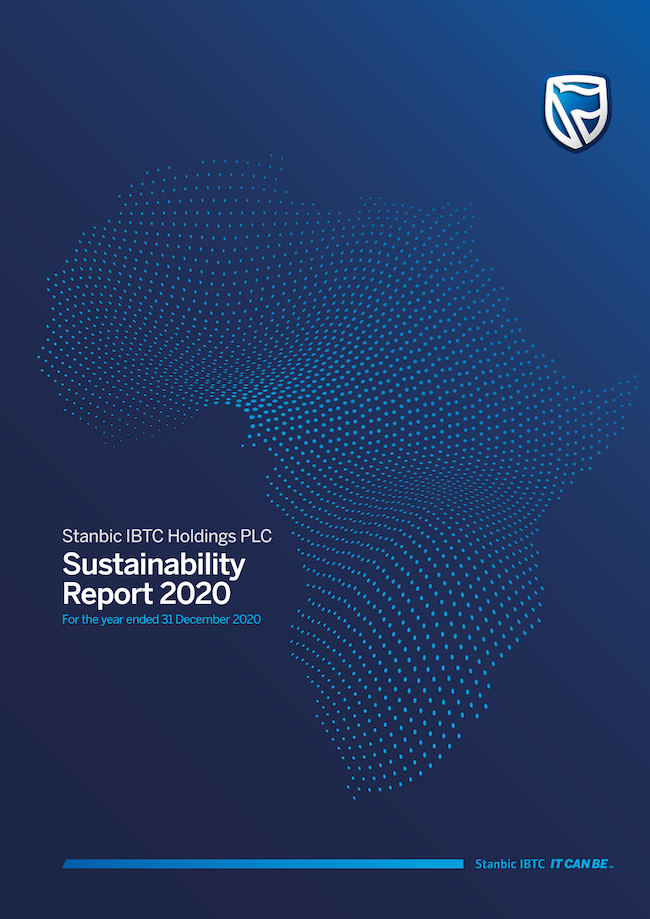Stanbic IBTC Holdings PLC (Stanbic IBTC), a member of Standard Bank Group, released its 2020 Sustainability Report to showcase its positive contributions that were centred on achieving the United Nations’ Sustainability Development Goals (SDGs).
The SDGs are geared towards improving societies for humanity and advancing sustainable development in the Nigerian community
The Stanbic IBTC sustainability report highlighted the organisation’s environmental, social and governance (ESG) practices, which cut acrosss corporate social investments (CSI), environmental and social risk management practices, and performance.
Dr Demola Sogunle, Chief Executive, Stanbic IBTC Holdings PLC, commented at the report’s release, “the Sustainability Report has highlighted our shared values in 2020, and is expected to help our key stakeholders better appreciate our long-term priorities to ensure financial, social, and environmental sustainability in our business operations.
“Our sustainability ambition is to become the leading financial institution driving sustainable finance solutions in Nigeria, and we have defined a sustainability strategy that is anchored on four pillars to achieve this.”
Stanbic IBTC’s sustainability pillars are aligned with the Nigerian Sustainable Banking Principles. The Group’s defined pillars are building environmental resilience, expanding business model and innovation, enhancing social relationships, and strengthening leadership for sustainability governance.
The Sustainability Report highlighted the progress Stanbic IBTC had made across the four sustainability pillars, and seven Social, Environmental and Economic (SEE) impact areas wherein the Group had confidence in achieving significant outcomes.
READ ALSO: Nigeria’s Gas Reserves Surpass 2020 Target
The report reflected that Stanbic IBTC made significant carbon emission savings, and reduced its total carbon emission by 1.67 tonnes in 2020. Hybrid solar systems were deployed in its branches and off-site ATMs.
Additionally, a 30% reduction in paper use was achieved in its Go-Green branches initiative that contributed indirectly to a decrease in tree-felling for paper production.
Stanbic IBTC conducted waste audit exercises across three head office campuses to quantify the amount and types of waste generated at the locations for better waste management insight.
As part of the Group’s sustainability governance in the year 2020, Environmental and Social Risk awareness trainings were conducted to educate its staff on the importance of Environmental and Social Risk management.
The report also highlighted Stanbic IBTC’s contributions to addressing the United Nation’s Sustainable Development Goals (SDGs). Stanbic IBTC and its parent brand, the Standard Bank Group, partnered with UN Women to promote women’s economic empowerment through climate-resilient agribusiness.
Over 3,000 entrepreneurs were trained in business sustainability. New School Money, an initiative on financial literacy for young people, was also shown to have impacted the lives of young people.
The report showed that a total of ₦109.4 million was donated under its employee volunteerism scheme. The donations were chanelled towards the Group’s three CSI pillars: health, economic empowerment, and education to help achieve qualitative healthcare and education, and sustainable economic empowerment.
Other initiatives aligned to the SDGs included a partnership with GB Foods to boost productivity and the donation of foodstuff to charitable organisations in the fight against hunger.
Stanbic IBTC also helped provide medical facilities and supplies to hospitals and community health centres in terms of health and wellness. At the same time, efforts in curtailing the coronavirus pandemic cost the organisation over ₦345 million in funds and relief material donations.
Other initiatives included the donation of educational facilities to different schools and learning centres and the award of scholarships to exceptional students across the country.
In support of gender equality, Stanbic IBTC established lactoriums in its offices to help working mothers’ transition back to work after maternity leave, and thus enhanced the inclusion of females in the workplace.
Furthermore, in the outset of the COVID-19 outbreak and lockdown, Stanbic IBTC put a debt relief programme in place to alleviate the potential cash flow constraints its clients faced due to the pandemic.
Forbearances were granted to clients on a total exposure of N78 billion as at 31 December 2020.
“As the leading end-to-end financial services organisation, we have a duty to set the standard in the way we address environmental, social and governance issues.
“We are proud to report that we are making significant progress, and we would continue to build on our 2020 milestones,” said Dr Sogunle.
A copy of the report can be downloaded here.













